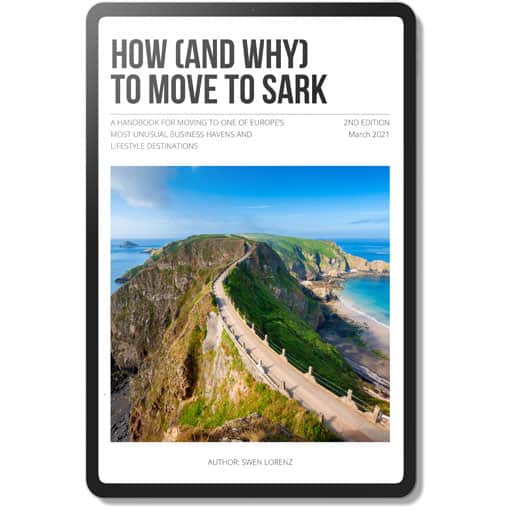The Green Party of the Netherlands has tabled a proposal that would “lock in” companies and, effectively, prevent them from ever leaving the country.
“That doesn’t affect me”, most will say.
You just wait and see. Stringent new measures are usually implemented on the back of (unpopular) minorities and later expanded to everyone. Two or three further steps down the road, it could well be you who finds themselves locked in.
If you reside and/or own corporate assets in an EU country, now is the time for you to look into these matters. 31 December 2020 will be a fateful date to secure both your financial future and fundamental freedoms.
Here is why, and what you can do about it.
The Dutch attack on long-standing legal principles
The proposal by the Dutch Greens may be a niche subject, but it represents a departure from long-established legal principles. When such seismic shifts occur, it’s worth paying attention to details and considering how it might affect you one day.
Unilever, the binational Dutch/British consumer goods company, has decided to simplify its legal structure and create a singular corporate headquarters in Britain. Legal entities the world over have the right to enact such changes.
“No can do”, say the Dutch Greens.
They have now tabled a bill that would retrospectively place punitive taxes on any company larger than EUR 750m annual revenue that wants to relocate to a jurisdiction with more favourable tax rates. In the case of Unilever, it would be a EUR 11bn tax bill. [1]
Nota bene, departure taxes on corporations and individuals are an established and entirely legitimate concept. They are aimed at taxing past value creation that has taken place on their sovereign territory but which hasn’t resulted in taxable gains yet – these are then taxed on the day of leaving.
However, the Dutch proposal would give departure taxes an entirely new approach:
- Effectively, it will tax FUTURE gains that will take place outside of their jurisdiction.
- Deliberately, the tax will have a stark punitive character.
The fact that this is now supposed to apply retrospectively to Unilever only adds insult to injury.
Quite simply, the measure is designed to erect a wall around the country and prevent companies from leaving.
However, few understand the gravity of this development. It takes some understanding of the principles of taxation and a certain sensitivity to notice when important boundaries are crossed.
The Green parliament member leading the proposal described it as “deadly serious [2]”. Also, even though such a special tax might be illegal, the party would not stop from pursuing this policy [3].
The Dutch Greens hold just 9% of the parliamentary vote. Still, according to a 9 October 2020 Bloomberg report, the party has received “positive feedback from three of the four political parties in the current coalition government”.
The result of this particular initiative remains to be seen, not the least as a new law is likely to be challenged in the Netherland’s highest court. Still, only a fool ignores the signals that these political actions send to the public – not the least because a similar development is already taking shape for individuals that are considering to move to countries with “softer” tax regimes.
Frau Merkel’s latest innovation in departure taxes
Germany, the country that tends to lead EU politics in many aspects, has had a long-standing love affair with departure taxes and the various political elements that typically come with it.
The country launched the most infamous departure tax in human history: the Reich Flight Tax, enacted in 1931. Initially, this tax was designed as a capital control measure to deal with the economic fallout of the Weimar Republic. The Nazis then used the existing legislation and shifted its focus. Subsequently, it became a form of legalised theft to confiscate the assets of Jewish families who were fleeing persecution.
The EU demands all its member states to implement an exit tax for individuals by 2021 and base it on certain principles.
In taxation circles, Germany has long been known as the country with the most profound historical tie to the concept of a departure tax. It is also quite famous for its Neidkultur, literally a culture of envy towards wealthy individuals [4]. Consequently, punishing those who have done well and dare to leave for greener pastures gels well with a large part of the electorate.
The EU demands all its member states to implement an exit tax for individuals by 2021 and base it on certain principles. Germany has already made it clear that it will go above and beyond the EU’s requirements.
Following past court decisions and based on the concept of freedom of movement, EU countries (begrudgingly) had to permit their citizens to defer the payment of departure tax for five years if they moved to another EU country. Such deferred payments were then routinely granted interest-free. Émigrés did not have to post any security to be given a deferral.
Germany is now working on switching to a new regime from 1 January 2021 onwards:
- Émigrés will have to pay their exit tax in seven equal instalments over seven years; i.e., the first payment is due right after leaving.
- To be granted the deferral of the second to seventh instalment, they will have to post a security that covers the entire deferred amount.
Someone whose wealth is primarily tied up in their own company will find it nigh impossible to provide a security that covers the entire tax owed unless they sell their company or a major stake in it. Most successful entrepreneurs have >90% of their wealth tied up in their company, and lack the financial means to pay a capital gains tax on a fictitious sale.
Proponents of these new regulations claim it’s a legitimate tax aimed at raising revenue. Given the obvious impossibility this creates for a high percentage of individuals and companies that are considering to leave, it’s not unreasonable to say that, ultimately, it’s aimed at preventing people from leaving, full stop. Germany, too, seems to (mis-)use the tax system as a means to reduce people’s freedom to choose a new residence and operating base.
Slowly boiling the frogs
EU residents remind me of a famous fable. If a frog is put into boiling water, it will jump out. However, if the frog is put in tepid water which is then slowly brought to a boil, it will not perceive the danger and be cooked to death.
Someone whose wealth is primarily tied up in their own company will find it nigh impossible to provide a security that covers the entire tax owed unless they sell their company or a major stake in it.
There is a long list of areas where EU residents are currently losing their freedom.
For example, if you live in the EU, you will have already lost your online access to over 1,000 American newspapers (I wrote about this else [5]). As a result of GDPR, the EU regulation on data protection, a four-digit number of American newspaper publishers have made their publications unavailable to Internet users inside the EU.
Right now, many of those who are affected cast this off as irrelevant:
- “Who reads American newspapers anyway?”
- “American publishers could simply accept EU law.”
- “Orange Man Bad.”
- Etc.
The question that needs to be asked is, what will be the progression of these various developments? It would take a certain naivety to assume that the EU wasn’t well aware of the collateral damage that GDPR was going to produce.
Where this all goes remains to be seen. I wouldn’t be surprised if one day, EU residents were banned from using Facebook, and required to use an EU-approved social network.
The pattern is always the same. You start with niche areas or unpopular minorities, and then expand measures to everyone in politically opportune moments.
If you feel safe and happy inside the EU, I respect your view and wish you well.
I wouldn’t be surprised if one day, EU residents were banned from using Facebook, and required to use an EU-approved social network.
Those among you who sense that, yet again, something is going horribly wrong in Continental Europe should consider their options. All the more since the current coronavirus pandemic has enabled politicians to implement extreme new measures at an astonishing pace.
You have 79 days left
The day and age when you could compartmentalise your life and split yourself between different countries are long over.
Stashing money away in secret Swiss bank accounts?
Operating some of your business through clandestine offshore companies?
All of this was always illegal to begin with, and nowadays, you are 100% certain to get caught. Since the mid-2010s, the global information exchange between banks and tax authorities has led to such measures being even more unadvisable than they were in the past. Unless you are crazy enough to send your money to truly exotic Mickey Mouse countries or dictatorships, there is no place that allows you to hide anything.
Today, there is only one way: move “A&A”, or “ass and assets”. Do it for as long as you are still able to make such a move. If it’s an expensive move already because of existing regulations, then consider whether it might not become even more expensive if you wait. With how the world is going right now, it’s probably advisable to take such a step for as long as you are still allowed to move anything at all – whether A or A. When you do implement steps, always seek proper legal advice; don’t try to be clever and cut corners, and generally play it safe.
31 December 2020 is an important deadline in this regard:
- Last day EU citizens can move to the UK without a visa.
- Last day EU citizens can move to the Channel Islands without a visa.
- Last day Germans can use the old deferral regulation for exit taxes.
Why is the UK of such particular interest? Because it could be a first step to move elsewhere but without moving to a so-called “tax haven” right away; because if you do, that could get you extra punishment at the time of leaving, such as a special tax audit because your move is deemed particularly “suspicious”.
What’s with the Channel Islands? It’s one particularly interesting haven of safety that I happen to know something about. The culture, political landscape and economic situation in the Channel Islands still allow you to choose a mode of being that is in line with conservative European values.
When you do implement steps, always seek proper legal advice; don’t try to be clever and cut corners, and generally play it safe.
I am pretty sure there are other aspects that I forgot. Every EU country will have an exit tax regime from 2021 onwards, and there’ll be many more aspects for citizens of other EU nations that I didn’t cover in this article. I just happen to have an eye on Germany, and on the UK and the Channel Islands as possible destinations that appear somewhat safer. The broader trend is largely the same across the EU member area.
Call me crazy – like many did three years ago
Given COVID-19, it’s now even more difficult to say where it’s all going to end up.
My very own antennas, however, are fairly attuned to any major developments. I already saw the world heading into the wrong direction in 2017 and decided to move A&A to the safety of the island of Sark in the English Channel. It seemed crazy back then, but I am now envied by many (which is why I am helping others to move there while they can [6]).
Please don’t mistake me as an expert on all exit taxes in all countries. If you are looking for a website specialised in this subject, check Christoph Heuermann’s Staatenlos [7] (German version) or Tax Free Today [8] (English version). Or seek professional advice from a regulated firm in your jurisdiction.
What I do know for sure is that some countries and political institutions are culturally more attuned to abusing the current opportunity for governmental overreach than others. Also, the people of some countries are more likely to push back against it than others. I’d always feel a bit safer in the English-speaking part of Europe. Continental Europe has had many centuries of ever-new conflicts and crises, and it’s only been a short 75 years since the US-led Allies pieced the political situation of the Continent back together. That is not a particularly long track record, all the more since it didn’t come from within. Always keep in mind what a country has in its DNA. Having behaved well for two or three generations is a short blip in history.
All I can say is, ignore the warning signs from the Old Continent at your peril.
P.S.: Attentive followers of my website will notice that I committed the heinous act of equating “Europe” with “EU” in the headline of this article. One is an ancient landmass, the other one a relatively young political experiment. Obviously, Europe doesn’t equal EU, thanks to countries such as Switzerland or Norway. For once, I permitted myself the freedom to use the term interchangeably for the sake of a catchier headline. May the Lord forgive me!
If you enjoyed this article, you will probably also like:

Looking for clever ways to invest your hard-earned cash?
Head over to my investment website Undervalued-Shares.com [12] for common sense investment opportunities from around the world. Ideas that you won’t find anywhere else!
Did you find this article useful and enjoyable? If you want to read my next articles right when they come out, please sign up to my email list [13].
Share this post:

